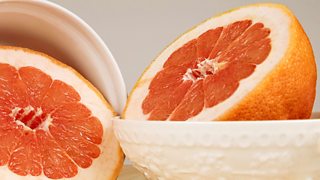Does eating cranberries help with urinary tract infections?
It’s commonly said that cranberries – or more specifically, drinking cranberry juice – can help with urinary tract infections, or UTIs. But is it true?
UTIs are pretty common, especially in women – about half of whom will get one at some point in their life. They are infections that occur in the kidneys, bladder, the urethra (the tube that we pee out of) and all the other tubing that connects the kidneys to the bladder.
As with any illness, prevention is key. UTIs usually happen when bacteria from the gut get into the urinary tract and one simple way to prevent this from happening is to be careful when wiping after going to the loo - wipe from front to back rather than the other way round. Keeping yourself well hydrated, making sure you pee whenever you need to rather than holding a full bladder too long, and also peeing after sex can also help prevent UTIs.
But what about cranberry juice? Can it really help?
Cranberries, and in turn cranberry juice, contain a group of chemicals called proanthocyanidins (PAC). These can prevent the bacteria responsible for UTIs attaching properly to tissues in the urinary tract. If the bacteria can’t attach properly then they cannot grow and cause the infection. However there are mixed opinions on whether or not it works in preventing UTIs. Some studies have shown some small benefits to healthy, non-pregnant, women who suffer from repeated infections while others have showed no benefit at all. Interestingly, there was a large number of drop-out in some of these studies due to volunteers finding it difficult to consume so much cranberry juice!
This is where the problem with cranberry juice can lie. Cranberries are very bitter and so to make cranberry juice easy to drink, lots of sugar is added – about three teaspoons of sugar in every 100 ml! This means with a typical 300 mL glass of cranberry juice you would have had more than your recommended intake of sugar for the day!
Aside from the sugar, there is one other thing that you need to consider if you decide to drink cranberry juice – interactions with the medication warfarin – used to thin blood. There have been reported cases in which drinking a lot of cranberry juice whilst on warfarin has caused problems, possibly because Vitamin K in cranberries affects the way warfarin works. If you do decide to drink cranberry juice and are on warfarin, discuss it with your doctor first as they may want to monitor you or adjust your dose.
If you suffer from repeated urinary tract infections, you might want to consider a low dose of antibiotics – Hiprex is used commonly in the UK to prevent repeated infections. Discuss it with your doctor and look at trying to prevent infections by following the steps outlined above.
Symptoms
Medically, there are two classifications of UTI – those that affect the bladder and urethra are lower UTIs and those that affect the kidneys and the tube between the kidneys and the bladder are known as upper UTIs.
The symptoms for both forms of UTIs are:
- Pain when you pee
- Urine that looks cloudy, it may also have some blood in it or smell particularly bad
- Needing to use the toilet more than normal, or getting very sudden urges to go
- When you do get to the toilet, you may feel like your bladder is not fully emptying
- Pain in your stomach
- Generally feeling unwell
Upper UTIs can be much more dangerous and have more complication than lower UTIs, so in those cases look out for:
- A fever of over 38°C (100.4°F) and/or shivers and chills
- Pain in your sides or back
- Feeling like you will be sick or actually vomiting
- Confusion, agitation and restlessness
Treatment varies depending on the type of UTI you have, but if it is the first time you have had an infection, or if you have an Upper UTI, you should see your doctor and will be treated with a short course of antibiotics. You may also want to take paracetamol to help with the pain and make sure you drink plenty of water.
-
![]()
It’s not just booze to be aware of if you’re taking pills.





































































